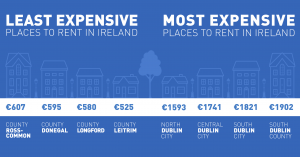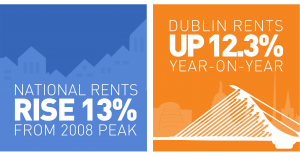
By Ann Marie Foley - 23 August, 2017

A new all-time high in rent has been set according to the property website Daft.ie, causing homeless charities to caution that even more people will become homeless.
The latest published figures show that the average monthly rent nationwide during the second quarter of 2017 was €1,159. In Dublin the increase in rents in the year to June 2017 was 12.3 per cent and rents in the capital are now over 18 per cent higher than their previous peak in 2008, up by €260 per month.

Pat Doyle, CEO, Peter McVerry Trust
Following the release of these figures in the Daft.ie Rental Price Report, Peter McVerry Trust (PMVT), a housing and homeless charity, has called on the government to build affordable rental housing.
“The rising cost of rent is the main source of new homeless cases, and our worry is that we will see even more households losing their homes as the situation worsens,” said Pat Doyle, CEO at Peter McVerry Trust.
“Unfortunately, rising rents also make our job of finding homes more difficult. At the moment we don’t have enough social housing so we are overly reliant on the private rental sector. If rents continue on their runaway path, and alternative affordable supply is not forthcoming, then we cannot secure homes for people to move out of homeless services.”
Pat Doyle said the solution is for the State to build affordable rental properties, and he urged the government to instruct and resource councils to begin building. PMVT had suggested this in its submission to the review of Rebuilding Ireland (the government plan on housing and homelessness).
PMVT expressed concern at the growing number of people who are stuck in a “very precarious situation” where they earn too much to qualify for traditional social housing, but not enough to buy a home. They are then subjected to higher and higher rents.
PMVT said that the cheapest, most effective way to build is for councils to use small sites to begin creating affordable rental blocks, purpose built to meet the needs of people who cannot afford private rents. This could also lessen reliance and pressure on the private market.

The Daft.ie report shows that rents rose nationwide by an average of 11.8 per cent in the year to June 2017 as supply of housing plummeted. This was a slight reduction from the rate recorded in the first quarter of 2017 (13.4 per cent).
There were just 2,930 properties available to rent nationwide on 1 August 2017. This is the lowest number ever recorded, in a series that starts in January 2006, and the first time ever that fewer than 3,000 homes were available to rent. In Dublin, there were just 1,100 homes available to rent, compared with 2,000 on the same date in 2014.
Ronan Lyons, an economist at Trinity College Dublin and author of the Daft.ie report, commented that: “The start of the academic year in September traditionally meant that July and August are two of the busiest months for the rental market each year. In the last two years, however, there has been no summer rush of properties to rent. In a market with such chronically deficient supply, it is therefore unsurprising to see rents reach a new high.”
He added that while rent controls may help sitting tenants, they make the market more difficult for those looking for a new home. He said that as the rental market remains in “severe distress”, the best policy is to increase supply of all forms of housing. For example, purpose-built student accommodation is vital as Dublin alone needs a block of 300 student beds approved every month until the late 2020s (based on demographics and other factors).
Katie Ascough and Kevin Keane, Presidents of UCD (University College Dublin) and TCD (Trinity College Dublin) Students’ Unions respectively, said that more than 50,000 Leaving Cert graduates from the class of 2017 are now looking for a place to stay.
According to Daft.ie, the year-on-year change in rents in the second quarter (Q2) 2017 were:
• Dublin: €1,707, up 12.3 per cent
• Cork: €1,122, up 6.8 per cent
• Galway: €1,026, up 10.0 per cent
• Limerick: €919, up 10.8 per cent
• Waterford: €772, up 8.4 per cent
• Rest of the country: €824, up 11.9 per cent
The full report is available from: www.daft.ie/report